The Truth About Eddie:
Remembering POOR PRETTY EDDIE
by Chris Poggiali
I’m willing to bet that if you were a fly on the wall during any conversation about POOR PRETTY EDDIE that has ever taken place in the 36 years since it was first released, at some point during every one of those discussions you would’ve heard somebody say “I’d love to know the story behind that one!” Both stylish and sleazy, frequently at the same time, it’s a creepy melodrama to some viewers and a black comedy to others. Self-consciously arty one minute, gleefully tasteless the next, it stands with FIGHT FOR YOUR LIFE as one of the most durable genre-blending oddities to ever hit the exploitation circuit, sold to the masses as everything from a horror film and a sexy thriller to a redneck revenge flick and a blaxploitation programmer during its nearly decade-long tour of drive-ins and grindhouses. Made by pornographers yearning to go legit, it drops a talented cast of familiar faces and old pros into a rundown hotel in the Georgia backwoods and sticks them with a dialogue-heavy script more suited for an off-off-Broadway stage than the silver screen.
Ironically, as strange and sordid a movie as it is, POOR PRETTY EDDIE was viewed as a mainstream Hollywood project with crossover appeal by its chief investor, notorious Atlanta porn kingpin and underworld figure Michael Thevis. Responsible at one time for the distribution of 40% of the pornography in the U.S. -- not to mention the violent deaths of several competitors -- Thevis owned over 400 sex shops and X-rated theaters across the country and realized he could be heading for a very big Capone-like fall at the hands of the FBI without a few legitimate business ventures to funnel his money through. He already owned Cinematics, a company that made peepshow booths, as well as a music distribution firm, General Recording Corporation (GRC), which would later find great success with Sammy Johns’ multi-platinum hit “Chevy Van,” but in 1972 Thevis decided to expand his interests and try his hand at filmmaking. He invested first in the stateside release of a Chinese kung fu movie, BLOOD OF THE DRAGON (1973), then began production on a western comedy with Troy Donahue titled THE HOLE IN THE LEG GANG (a.k.a. THE LAST STOP), which has seemingly vanished if it was indeed ever finished.
Meanwhile, another low-budget western, TO HELL YOU PREACH (1972), had just been completed by director Richard Robinson and cinematographer David Worth, a production team that had previously made ADULTERY FOR FUN & PROFIT (1971) and other “adults only” movies of the soft as well as hard variety. Robinson and Worth knew Thevis through the distribution of those X-rated films and approached him with a script they owned, which had been penned by busy TV scribe B.W. Sandefur. “Richard got Thevis to finance the film,” says actor Michael Christian, one of the stars of TO HELL YOU PREACH and best known to TV viewers as the streetwise Joe Rossi on the popular series PEYTON PLACE. “Robinson knew Thevis wanted to make ‘straight’ motion pictures for PR and because I think [the FBI] was after him for any number of things. So that’s actually how I got the job. I had just played a Billy the Kid type of character for Richard in TO HELL YOU PREACH, and that led to me getting the part of Eddie. The girl I was dating at the time was friends with Shelley Winters from the Actors Studio, and so Richard hired Shelley through Jack Gilardi, who was an agent of mine, to play the part of Bertha.”
STAR TREK fans take note: Before singer Leslie Uggams landed the lead role, Nichelle “Uhuru” Nichols was up for the part of Liz Wetherly. “[The producers] flew her to Atlanta to meet with them, and she was going to do it,” says Christian, “but then they went with Leslie instead and they were very pleased with that decision, as was I. Leslie was a joy to work with.”
Uggams had won a Tony Award (for Hallelujah, Baby!) and hosted her own musical variety TV series on CBS, but was having a difficult time making the transition from stage and television to the big screen. “It was very hard for me to get films because, back then, everyone thought singers should sing and actors should act,” the entertainer reveals. “When I did SKYJACKED, the director [John Guillermin] said to me, ‘Why do you want to do this? You sing.’ I said ‘Well, I don’t just sing.’ I had studied acting since I was 8 years old. He just didn’t get it. There weren’t a whole lot of parts [for black women] other than in what they called ‘black exploitation’ movies, and I had never been asked to do any of those anyway.”
So when she was offered a substantial lead in a movie co-starring Shelley Winters, who had just received her fourth Academy Award nomination earlier that same year (for THE POSEIDON ADVENTURE), Uggams grabbed the role in a heartbeat. “I liked the cast, so to me this looked like a great opportunity that would hopefully turn into something,” she says. “I had not done many movies, so naturally I wanted to be in the company of people that I knew were wonderful actors and actresses. And then we all got down there [to Athens, GA] and were looking at each other going, ‘What happened? Did we miss something here?’ Because on paper it didn’t look like it was going to be a bizarre picture. It looked like this girl is on the road, her car breaks down and then she gets into this situation. It turned out the director had another thing in mind, and none of us could figure out what the heck it was!”
Uggams portrays a popular singer in POOR PRETTY EDDIE, but don’t think for a second that she’s simply playing herself. Liz Wetherly is a bitchy and selfish person, the polar opposite of Uggams, who’s one of the friendliest and most un-diva-like personalities this writer has encountered. “That’s another reason why I wanted to do it, because it was totally different from the kind of person that I am -- thank the Lord.”
In addition to tackling her first starring role on such an offbeat project, the actress had other new and awkward experiences to contend with. “I had never shot a gun before in my life. That was frightening. I had never driven a stick shift car before. That was frightening. And we were eating strange food all the time. It was like someone had just gone hunting and that was our meal for the day.”
The film’s main location was Charlie Williams’ Pinecrest Lodge, a legendary Athens eatery that needed almost no set dressing to become Bertha’s Oasis, the rustic hotel/restaurant owned and operated by Winters’ ex-stripper character. Every morning before the cast and crew call, Worth would roam the property with an Arriflex 2C camera and shoot atmosphere footage of everything from abandoned vehicles and creaky waterwheels to the myriad hunting trophies that adorned the walls of the restaurant-bar. “They had a 12-foot rattlesnake skin hung over the bar,” remembers stuntman Paul Nuckles. “I used to catch rattlesnakes in Malibu Canyon, and I’ve never seen a 12-footer. Six-foot is the biggest I’ve seen, and that’s plenty big enough.”
Thanks to the genius of film editor Frank Mazzola (who had previously worked on PERFORMANCE and THE HIRED HAND), Worth’s footage of the snakeskin and other animal trophies was used to great effect as segues and shock cuts, and his early morning exterior shots of the lodge laid the groundwork for a beautiful opening credit sequence.
Despite being in the company of so many professionals and having her mother, her 3-year-old daughter Danielle and occasionally her husband Grahame with her during the shoot, Uggams still felt uncomfortable being on location in such an out-of-the-way setting. “It was really kind of spooky and dark, because we were surrounded by woods and the sun could hardly get through. It was scary. Later I heard that Kenny Rogers had moved to Athens and I thought, ‘Well, he obviously isn’t living in the area that we were in!’”
Scenes were also filmed at the county jail and the American Legion hall in nearby Lexington. University students helped out on the production and also were cast in minor acting roles. Harbin “Red” Lawson, the former University of Georgia basketball coach, has a supporting role as a sleazy traveling salesman who, in one of the film’s more surreal sequences, becomes a victim of Eddie’s homicidal rage while taking sexual advantage of Liz. Sheriffs Gene Smith of Oglethorpe County and Tommy Huff of Clarke County also appear in supporting roles.
The shooting schedule was 6 weeks and the budget was announced in the press as being anywhere between “just under $1 million” to around $1.25 million. “I would say it was about $1.1 million,” figures Christian. “I know they were bringing Shelley’s money to her in a suitcase in cash, weekly, all the way from Atlanta out to Athens. I thought that was very interesting.” He laughs before adding, “She wanted the cash, and then she got all scared about where she was going to hide it.”
Winters was lucky that she made it to the location at all. While en route to Atlanta the night before shooting was to begin, the plane she was traveling on had to circle the airport for over 2 unbearably tense hours while the pilot attempted to lock the landing gear into place, forcing ground crews to foam the runway and prepare for the worst. The plane eventually made it to the tarmac safely, but the grueling experience may have pushed the normally bold and outspoken actress to new levels of brashness during the first few days of filming.
For example, the opening scene -- in which Uggams sings "The Star-Spangled Banner" before a capacity crowd -- was filmed at Atlanta Stadium on November 4th, 1973 before a game between the Atlanta Falcons and the Los Angeles Rams. Robinson and the cast joined Falcons owner Rankin Smith and several of his associates for an alcohol-fueled party in the owner’s box. Winters walked in and immediately began devouring a sandwich, unaware that it was Smith’s. “Does that dame know she’s eating my food?” the Falcons owner reportedly blurted out, to which Winters replied “Okay, you can have it back!” and smashed the mayonnaise-smeared top slice of bread into his face.
That’s not the only example of the feisty actress’ loose cannon behavior around food. At a surprise birthday party for Uggams’ husband, Winters threw a piece of cake into Robinson’s face. He responded by throwing a piece of cake into her face. Other members of the cast and crew quickly joined in, and soon food and drink was flying everywhere. “She and Robinson just got totally carried away,” Christian says with a noticeable lack of amusement. “It was like something out of ANIMAL HOUSE.”
“Shelley was a wild and crazy lady,” Uggams recalls. “She was so unpredictable. You never knew exactly what to expect.”
“She was wild,” agrees Christian. “We were all staying at a Howard Johnson Motor Lodge, and she jumped into the pool naked one night.” While filming one of their boudoir scenes, the two-time Academy Award winner tried to impress her hunky young co-star with a list of her many famous bedmates. “She gave me a rundown on all the lovers she’d had, from James Dean to Paul Newman to Marlon Brando, giving me ratings for Vittorio Gassman, Tony Franciosa -- while we’re in bed together waiting for the camera to be set up to do a scene, I gotta listen to all this, right? God bless ya, Shelley, I think you’re great, but really.”
“I had known Shelley from before, so there was already a friendship there,” says Uggams. “If she didn’t respect you, she would try to get away with things. I made sure that she respected me, so she and I got along very well, but with a couple of other people she would try to pull some fast things.”
Christian describes Winters as “terrific” and “very giving” but admits that the veteran actress did rub him the wrong way during the filming of the climactic wedding shootout. “When I flew off onto the table and was dying at the end, instead of relating with me, she was listening to music to get herself emotionally ready and crying,” the actor explains. “I ended up hitting the ice machine with my fist. I was trying to relate to her in the scene, and she was just listening to this music in her ear. I said, ‘Would you please relate with me?’ She said, ‘I worked with this one, I worked with that one, I worked with Monty Clift…’ I said, ‘Well you’re working with Michael Christian now, so just look into my eyes, I definitely can scare the shit out of you and make you cry a little bit, so come on, let’s get with it.’ But she just turned the music up louder. It was some classical music -- wonderful music, but I’d rather have an actor or actress relate with me instead of using references. So out of frustration I hit the ice machine and my hand swelled up. After we finished the scene I had to be taken to the hospital to make sure my hand wasn’t broken.”
“But working with her was a good experience for me,” he insists. “I started out playing Eddie more like an introverted, moody southern James Dean-type character and it was Shelley who said, ‘Nah! Be extroverted! Give him some life! Do the Presley thing!’ So I said, ‘OK!’ They gave me some outfits and I played him a little more flamboyantly. Shelley deserves credit for that particular touch on my character.”
“She just had her own way of doing things,” he continues. “She would let the makeup people do her makeup and hair – it would take two or three hours – and then she’d tear it all down and do it again herself. This was a daily ritual. She was always on a diet, too. She’d say, ‘I don’t want to eat this, I don’t want to eat that,’ and then suddenly she’d splurge and have three desserts at Howard Johnson at the end of the day.”
Luckily, someone had the foresight and good sense to invite legendary Hollywood columnist James Bacon to the location, resulting in several amusing pieces on the film’s production in general and Winters’ shenanigans in particular. All the silliness was very good publicity for the dark, offbeat film. According to Christian, in a Beverly Hills 213 article by Bacon just a couple of years ago, the writer was still referring to POOR PRETTY EDDIE as one of the most enjoyable times he’s ever had on a film set. He even shows up in the movie as an extra in the American Legion hall scene.
Also onscreen during this scene is musician Grant Boatwright, who composed the score and performed all the songs with Red, White & Blue(grass). Formed in Birmingham, Alabama in 1969 and also featuring Grant’s wife, singer-guitarist Ginger Boatwright, and banjo player Dale Whitcomb, the Grammy nominated band put out a couple of charting albums on GRC Records before signing with the higher profile Mercury label. Grant Boatwright also appears in Robert Altman’s NASHVILLE.
The cast and crew screening turned out to be one of the most eye-opening and memorable experiences of Uggams’ acting career. “First of all, Mae West was there. I said ‘Wow! Mae West! [Pause] What is she doing here?!’ And then sitting there watching the film, I kept thinking, ‘What the heck is this?!’ Look, I knew it was a crazy film, but I had no idea just how crazy it was going to be until I went to that screening and my husband and I looked at each other and said, ‘Where did all these dead squirrels come from?!’ I mean, they kept panning to shots of dead squirrels and possums and other kinds of dead things and I’m thinking, ‘What is this?!’ And then I thought, ‘Well, there goes my Oscar!’”
“It was a very weird film,” Christian concurs. “But Richard had that kind of personality, that kind of macabre style in him. He was like Lee Frost (PRIVATE OBSESSION) in that sense. Lee had a little bit of an imagination with the macabre in the films he did. I always ran into those kinds of guys. You just do your best as an actor, that’s all you can do. You go out there and try to fulfill the obligation of the part. In that way, I felt we pulled it off for what it was.”
“Listen, if they had made a film about making that film it would’ve been a much better film!” laughs Uggams. “The best thing about it was that my husband and I got to be dear friends with Ted Cassidy. We met him and his wife while doing the film and we became best, best friends with him. He was the calm person on the set who had some sanity.”
“Ted and his wife were very nice,” agrees Christian. “My girlfriend and I used to go out to Pacific Palisades where they lived to have dinner with them. We also went to Vegas to hear Leslie sing. And of course, Slim and Dub were old pros.”
“I got a call out of the blue [from stunt coordinator Ron Ross] to go down to Georgia somewhere to work on a film,” Nuckles says, trying to suppress laughter. “So when I get there, I walk into the bar, which was dark – it was noon and the whole company was in there, they’d just broke for lunch – and I hear this voice I recognize say, ‘Hey Nuckles! What’s the sweetest smelling flower in the world?’ I knew that voice was Dub Taylor’s. I said, ‘Jesus, Dub, I don’t know. What do you think it is?’ He said, ‘It’s the Morning Glory, ‘cause it grows right outside the shithouse! Hee hee hee hee!’” Nuckles lets out a laugh before adding, “He was a funny, funny guy. Slim was, too. They were trying to hook me up with Shelley Winters through the whole production.”
“I loved Dub Taylor,” says Uggams. “He was a riot and kept us laughing the whole time. We all got along very well. We had to -- we were all walking around saying to each other, ‘What did we get ourselves into?’ and ‘What the heck is going to happen next?’”
Denver-based distributor Jay O’Malin acquired POOR PRETTY EDDIE and gave it a decent theatrical release through his company Westamerica Distributing beginning in March of 1975. “The girl who was the head of the Elvis Presley Fan Club did a promotion with me,” Christian remembers. “She sent something out in the newsletter to all the Elvis fans telling them to see the movie because she thought they’d get a kick out of me shaking my hips.” The actor also heard that the movie’s racial subject matter had caused a riot at a Memphis drive-in during its initial run, but couldn’t recall the details. “Y’know, a black woman being kidnapped and raped by a honky -- I heard that didn’t go over so well at a drive-in down there.”
When Westamerica went out of business a couple of years later, Christian and Worth (along with several partners) bought the rights to POOR PRETTY EDDIE and all prints of the film and set about creating a lighter, more marketable alternate cut. “There’s no way in the world that the original version could play on TV back then, as hard as it was and as grotesque as it was in some scenes, like with the intercutting of Leslie’s rape with the dogs making lust,” Christian says matter-of-factly. “There were things in the central story that were pretty violent and racial, so this other version was a softer cut with all the macabre stuff taken out.”
The result, HEARTBREAK MOTEL (1978), eliminates all of the violence of POOR PRETTY EDDIE, downplays Eddie’s rape of Liz, moves Uggams’ performance of "The Star-Spangled Banner" from the beginning of the film to the end, and adds light-hearted narration by Eddie himself. The most important difference, however, is the addition of several outtakes that don’t appear in POOR PRETTY EDDIE, including one very good scene that reveals the back-story of Cassidy’s character, Keno. In another outtake, a shotgun-wielding Eddie protects Liz from a pack of hillbilly rapists.
“There’s some interesting stuff in there, and we put some bucks into it, but when you add it all up, it doesn’t add up to much,” Christian admits. “It was just us throwing some scraps and added footage together to try to make it work in a non-violent fashion so it could be marketable. I wanted something that wasn’t so ugly, but it didn’t hold because it was too thin. There’s no real storyline to it like there is in POOR PRETTY EDDIE.”
HEARTBREAK MOTEL also differs from POOR PRETTY EDDIE in that David Worth is credited as the director rather than Richard Robinson, who is billed as director of production on this version. “Richard and David actually co-directed POOR PRETTY EDDIE,” Christian explains, “and David had done so much work on it and was promised certain credit, so that’s another reason why we did the soft version. The credits changed because a certain amount of money was invested the film at that time.” Christian receives producer credit on the HEARTBREAK MOTEL edit, and several other co-producers are listed on this version as well, including Christian’s girlfriend at the time, actress Linda Marsh (from HOMEBODIES, FREEBIE AND THE BEAN and Elia Kazan's AMERICA, AMERICA), and his agent, Robert Diamond.
Christian and his partners sold POOR PRETTY EDDIE to Group 1 Films, who changed the title to THE GIRL IN THE WEB and then THE VICTIM before settling on REDNECK COUNTY for a 1979 re-release.
“They were originally calling it REDNECK COUNTY RAPE but they thought that was too hard so they took [rape] off the ads at the last second. Little did they know there was another REDNECK COUNTY out there already with Alex Karras,” Christian says, referring to Harry Thomason’s 1974 comedy THE GREAT LESTER BOGGS, which was still playing the drive-in circuit in '79 and had gone through even more title changes than POOR PRETTY EDDIE by that point.
Group 1 had no interest in handling HEARTBREAK MOTEL, however, so the alternate cut ended up being sold to Gold Key Entertainment. "It didn't get out into the marketplace that much," says Christian of the softer version. "It went to some little bitty video company and I think that’s the only thing that’s been seen of it." [HEARTBREAK MOTEL made its debut on home video in 1986 from VidAmerica].
For urban venues, Group 1 ditched the REDNECK COUNTY moniker and instead released the movie as BLACK VENGEANCE, usually paired with SLAMMER, a re-titling of the tough 1977 prison film SHORT EYES. Although POOR PRETTY EDDIE had already played the New York City market during its initial run in June of 1975 (through sub-distributor Aquarius Releasing), the BLACK VENGEANCE / SLAMMER double bill opened in eight theaters in the New York tri-state area on January 23rd, 1981 courtesy of Bedford Entertainment, another Manhattan-based sub-distributor. Christian was unaware of this incarnation, but not Uggams. “Oh, they tried everything with that movie!” she says, bursting into laughter. “Every time I turned around someone was telling me ‘It’s out again as such-and-such!’ They kept trying to sell it every different way!”
As if the history of this movie wasn't confusing enough, someone recently started a rumor that Floridian actor-director Chris Robinson (of STANLEY fame) was actually the director of POOR PRETTY EDDIE and not Richard Robinson, a total inaccuracy that has made its way onto a number of websites and message boards thanks to its appearance on the Internet Movie Database. This misinformation probably stems from the fact that Chris Robinson directed two movies with Ted Cassidy in the early ‘70s, one of them released as THUNDER COUNTY a few years before POOR PRETTY EDDIE was making the rounds as REDNECK COUNTY. In the small world department, Chris Robinson did call Christian shortly after seeing POOR PRETTY EDDIE in Florida to offer him a role in an episode of the TV series CANNON that he was going to direct. "He wanted me to play a football player, so I went over to the lot with him and threw the ball around, but the money wasn’t right so I didn’t do it," says Christian. “But otherwise, no, he had nothing to do with POOR PRETTY EDDIE. It was all Richard Robinson and David Worth.”
Hopefully this post has cleared up some of the confusion surrounding POOR PRETTY EDDIE. Looking at the new widescreen transfer on the recent DVD/Blu-ray combo from Cultra, it's safe to say that this warped and unique motion picture hasn't looked this good since -- well, since that very first cast and crew screening, when most of the participants stared at the finished film in slack-jawed disbelief. "And after it was over I remember thinking, ‘Wellllllll, maybe no one will ever see it,’" Uggams says with a laugh, "but somehow it just keeps rising like the phoenix!"
Special thanks to Leslie Uggams, Michael Christian, Paul Nuckles, Lawrence Cohn, Fred Adelman and Joe Rubin












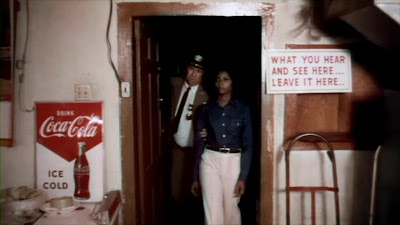




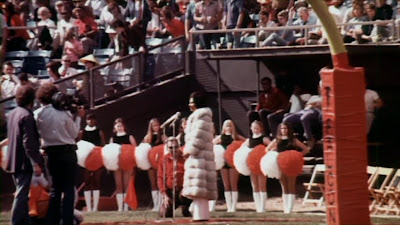


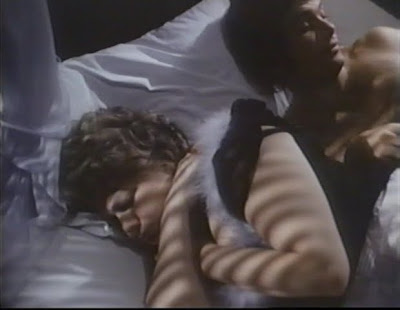


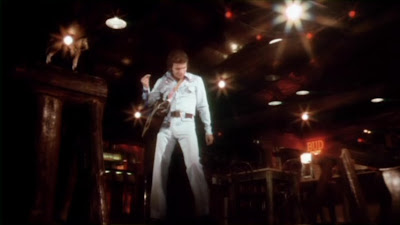
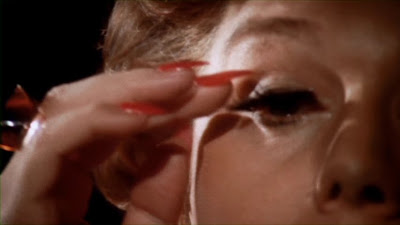




















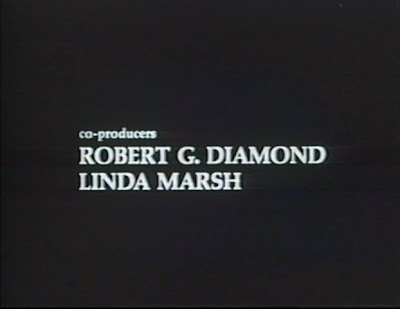
























11 comments:
Wow! Just some amazing research and writing on this one. Thanks for the detailed production history and Chris Robinson clarification (a mistake even I made in my review of it).
What great information on POOR PRETTY EDDIE! I'd always wondered how the ever-classy Uggams ended up starring in it. Great to hear that she's also a class act off-screen. Ted Cassidy was involved with some pretty off-beat projects in the mid-1970's post-Lurch (he even co-wrote THE HARRAD EXPERIMENT); sad that he left us so young. I definitely have to check out the new DVD of this. Again, great info Chris!
Thanks for the nice comments, guys! I just noticed while putting this post together that SHARKY'S MACHINE and PRIMAL FEAR novelist William Diehl was "in charge of production" on the Michael Thevis-released BLOOD OF THE DRAGON -- another credit that's not on Diehl's IMDb page. I wonder now if Thevis had a hand in Diehl's two Atlanta-lensed directorial efforts, THE SECRETARY and ALL THE YOUNG WIVES.
Thanks, Chris. I'm in the minority in that I don't think EDDIE is very good, but I obviously love learning about films like it. Is Uggams still performing? You couldn't turn on the TV during the 70s without seeing her on one variety show or another.
William Diehl directed films? Now that I'm interested in.
Fantastic article, Chris. I've got to see it now. Had never even heard of it before. Thanks for the eye-opener. -DAVID SAVAGE
Marty: I saw Leslie Uggams on an episode of Alfre Woodard's series MEMPHIS BEAT a few weeks ago and she's still doing stage work AFAIK.
Dedicated and lovingly compiled piece that's even better than the abridged liner notes version that's in text form on the DVD/Blu combo.
Much fun, thanks!
Thanks for the excellent piece on PPE, Chris- deep, deep research, and very well-written. Now I have to pick up a copy of the DVD/Blu.
Regarding The Hole in the Leg Gang/The Last Stop: A year or two (or more) ago, I read several brief articles about this in old (online) issues of Boxoffice magazine. I would like to know about the status of this one (lost, unfinished, or otherwise) myself. The IMDb claims that Paramount Pictures was the production company for The Last Stop- ?! If any of the Boxoffice articles on the movie mentioned Paramount in any way, I had forgotten that little tidbit entirely.
Really superb article and research.
NOTE: about the music, the song played in the town hall, "The Lovin's Over", appears in Ginger Boatwright's "Red, White & Blue (Grass)" album, where it is performed by his wife Ginger, who actually wrote song (in the movie it's another women performing it).
Thank you again for an amazing article about a strange weird gem of a film.
As of 2016 I have lived in Athens, GA for almost 20 years. Obviously, long after this gem of a flick was shot here. Not surprisingly, I have never heard of anyone mention this film being shot around town. I have since learned that I live around where most of this film was shot. The old Charlie Williams Pinecrest Lodge was a landmark for many years - not because of this film - but because of the food and antique memorabilia. Like many places in Georgia, this place has vanished and is now a subdivision, however, not before it has been immortalized in this film. As for the memoralbilia of of the Lodge, much can be found redistributed, sold and repurposed around town.
I actually stumbled across this bizarre film while researching the Historic Barnett Shoals, GA mill town - about 7 miles south of where the Charlie Williams Pincrest Lodge was located. In one of the still images of the film - (perhaps a promotional shot?), Poor Pretty Eddie, stands with guitar and white sequin suit on a pile of rocks at the base of the waterfalls of Barnett Shoals Dam on the Oconee River, where the mill town was once located. I actually own the property where the mill town was located adjacent to the shoals. I have yet to see this film, does anyone know if the falls were used in a scene of this film? Any and all info on the filming locations of this movie is greatly appreciated. Thanks!
Post a Comment